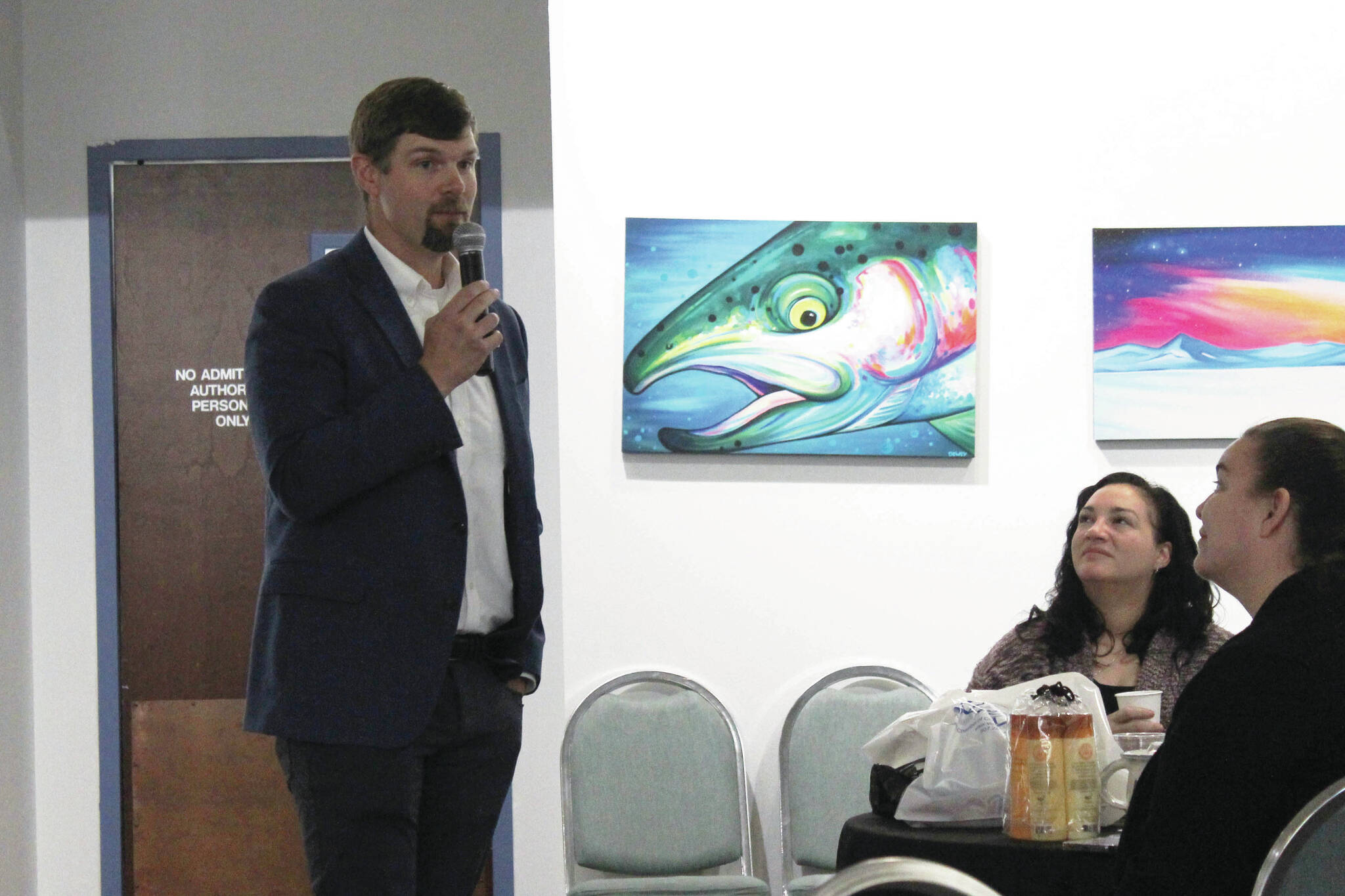School funding, lumber grading and state finances were among the topics State Sen. Jesse Bjorkman hit during a presentation to a joint meeting of the Kenai and Soldotna chambers of commerce.
Speaking from the Kenai Chamber of Commerce and Visitor Center, Bjorkman, a Republican from Nikiski, summed up the work he did last session, previewed next session and fielded questions from attendees.
He started off by reporting “not a lot of craziness” in Juneau and said, for all their disagreements, most lawmakers in Juneau are there because they love Alaska and want to make it a better place.
“They’re doing things from a heart that loves Alaska and loves the place that they are from in our state and they want to make sure that our state is a great place for us to live and for our kids to live,” Bjorkman said of his fellow legislators.
He highlighted the passage of his local lumber grading bill, which Gov. Mike Dunleavy signed into law last week.
That bill makes it easier for Alaska mill operators to grade their own lumber by creating a grading certification program through the Alaska Division of Forestry. That lumber can be used to build houses in Alaska and must be milled such that it meets or exceeds applicable building codes.
“This is a really great program to add value to our timber resources, not just here on the Kenai Peninsula, but especially in areas of our state where the cost of building materials is quite high,” Bjorkman said.
Bjorkman also pulled out highlights from the state budget, which he described as the Alaska Legislature’s “ultimate assignment.” Though they passed a budget, Bjorkman said he and other state lawmakers have a longer-term goal of crafting a durable fiscal plan for the state.
The budget document passed this year, he said, provides fiscal stability for Alaska by not implementing a broad-based tax and not increasing taxes on industry. The document gives Alaskans a $1,300 permanent fund dividend and leaves the state with a $375 million surplus.
Bjorkman, who is also a teacher at Nikiski Middle/High School, said he expects state funding for Alaska’s public schools will again be a big issue during the upcoming session. A key reason for that, he said, is because schools are being expected to do “more and more with less and less” as the purchasing power of the state money they receive, which has stayed flat since 2017, goes down.
This year, school districts in Alaska received $87.5 million in bonus funding through the budget document signed by Gov. Mike Dunleavy. The version of the state budget passed by lawmakers initially included $175 million in bonus one-time funding for schools, however, Dunleavy halved the amount.
Bjorkman said a meaningful increase to the amount of money Alaska school districts receive per student, also called the base student allocation, is more effective when it comes to educating students than one-time funding.
“We need money inside the (foundation) formula that school districts can count on to build up educational opportunities, to expand programs and opportunities for kids in schools,” Bjorkman said. “One-time money is spent a lot on one-time staff, and that’s not the best way to educate kids and provide them with opportunities.”
Bjorkman said central Kenai Peninsula residents should also keep their eyes on the Alaska Department of Transportation and Public Facilities, which he said will be hosting a town hall on the Kenai Peninsula later this month. Among the topics he’s monitoring are flooding in the northwest area of Kalifornsky Beach Road, and the corrosive effects of salt brine on vehicles.
Bjorkman further reported progress on legislation that aims to alleviate tensions in Cook Inlet’s east side setnet fishery while helping conserve chinook salmon populations. The legislation would establish, after a vote in favor by permit holders, a voluntary buyback program through which the fishery’s existing permit holders could retire their permits and be compensated.
The legislation was one long-championed by Bjorkman’s predecessor, Peter Micciche, who touted the program as one that would allow set netters to fairly exit the fishery while reducing overall the amount of fishing gear in the water. Bjorkman said Wednesday that the program would be paid for with distressed fisheries grants, through the National Oceanic and Atmospheric Administration and other nongovernmental organizations.
“We got that bill passed out of (the Senate Resources Committee) this year and it’s in (the Senate Finance Committee),” Bjorkman said. “I’m looking forward to seeing that bill move out of the Senate Finance early in this next session.”
Alaska’s state lawmakers will return to Juneau in January for the legislative session. More information about state lawmakers and specific bills can be found on the Alaska Legislature’s website at akleg.gov.
Reach reporter Ashlyn O’Hara at ashlyn.ohara@peninsulaclarion.com.

